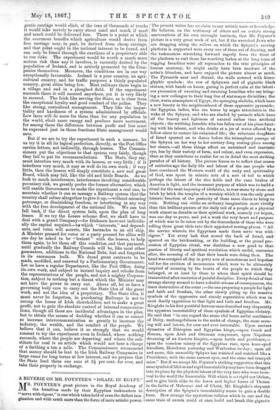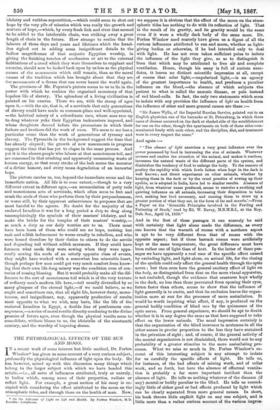A REVERIE ON MR. POYNTER'S "ISRAEL IN EGYPT"
MR. POYNTER'S great picture in the Royal Academy of the Israelites made by their Egyptian taskmasters to "serve with rigour," is one which takes hold of even the dullest ima- gination and with much more than the force of mere artistic power. The present writer has no claim to any artistic taste or knowledge: He believes, on the testimony of others and on certain strong asseverations of his own untaught instincts, that Mr. Poynter's picture is a very great work of art, but if the wretched Jews whoa are dragging along the rollers on which the Sphynx's moving platform is supported were every one of them out of drawing, and the taskmasters stretching forward eagerly from the front of the platform to curl those far-reaching lashes at the long team of tugging Israelites were all reproaches to the true principles of human anatomy, he might easily have been unaware of the artist's blunders, and have enjoyed the picture almost as much. The Pyramids near and distant, the walls covered with hiero, glyphic symbols ; the row of Sphynxes and of gigantic black statues, with hands on knees, gazing in perfect calm at the labori- ous procession of sweating and straining Israelites who are bring- ing a new colleague to their long line of statuesque divinities ; the clear, warm atmosphere of Egypt, the springing obelisks, which have a new beauty in the neighbourhood of those oppressive pyramids; the Egyptian ladies, who are borne by negro attendants in the wake of the Sphynx, and who are shaded by parasols which have all the beauty and lightness of natural rather than artificial• objects ; the writhing Israelite who has fallen out of his place faint- ing with his labour, and who drinks at ajar of water offered by a fellow-slave to restore his exhansted life ; the reluctant daughters of Israel spurred on to dance before the triumphant passage of the Sphynx on her way to her century-long resting-place among• her sisters,—all these things affect an untrained and inartistic eye, less by their variety of form, and colour, and even expression, than as they contribute to realize for us in detail the most striking. paradox of all history. The picture forces us to reflect that scores of centuries ago the daily life and labour of the one people who have convinced the Western world of the unity and spirituality of God, was spent in minute acts of a sort of toil to which perhaps the labour of the rice fields and the cane brakes of America is light, and the incessant purpose of which was to build a ritual for the most imposing of idolatries, to rear stone by stone and brick by brick the temples of a worship which it was the only great historic function of the posterity of these same slaves to bring to ruin. Nothing can strike an ordinary imagination more vividly than this brilliant picture of the daily toil of a people at a physical work almost as durable •ad their spiritual work, scarcely yet begun, was one day to prove, and yet a work the very heart and purpose of which was to be eaten out by the descendants of those who wero rolling these great idols into their appointed resting-places. " All- the service wherein the Egyptians made them serve was with rigour." Yet every lash that scored the back of Israel, and spurred on the brickmaking, or the building, or the grand pro- cession of Egyptian ritual, was doubtless a new goad to that. passion of liberty and spiritual revolution which undid, centuries. after, the meaning of all that their hands were doing then. The hand was occupied all day in petty acts of monotonous and hopeless toil for the erection of monuments which were to be ultimately emptied of meaning by the hearts of the people to which they belonged, or at least by those to whom their spirit should be transmitted after centuries of painful discipline. Every detail of that strange slavery seemed to have a double stream of consequences, the inner destructive of the outer ;—the one preparing a people for light and faith and freedom, the other slowly piling up the massive symbols of the oppressive and stately superstition which was in most deadly opposition to that light and faith and freedom. Mr. Kinglake in his first youthful fervour once described very eloquently the apparent immutability of these symbols of Egyptian idolatry. He said that "in one regard the stone idol bears awful semblance of Deity, unchangeftilness in the midst of change, the same seem- ing will and intent, for ever and ever inexorable. Upon ancient dynasties of Ethiopian and Egyptian kings,—upon Greek and Roman, upon Arab and Ottoman conquerors, upon Napoleon dreaming of an Eastern Empire,—upon battle and pestilence,— upon the ceaseless misery of the Egyptian race, upon keen-eyed travellers, Herodotus yesterday and Warburton to-day ; upon all and more, this unworldly Sphynx has watched and watched like a Providence, with the same earnest eyes, and the same sad tranquil mien." But if we accept Mr. Poynter's striking suggestion that this same symbol of lifeless and rigid immutability may have been dragged into its place by the physical labour of the very race who were to re- veal to the world the Immutable Will which is not rigid nor lifeless, and to give birth alike to the lower and higher forms of Theism in the faiths of Mahomet and of Christ, Mr. Kinglake's eloquent description of the Sphynx's immutability seems to gain a double force. How strange the mysterious volition which in one and the same train of events could at once build and break this gigantic
idolatry and ruthless superstition,—which could seem to shut out hope by the very pile of miseries which was really the growth and nurture of hope,—which, by every fresh link and rivet that seemed 4o be added to the intolerable chain, was striking away a great length of chain in the future. How strange to realize that the labours of those days and years and lifetimes which the Israel- ites sighed out in adding some insignificant details to the hollow magnificence of that majestic Egyptian worship, in
giving the finishing touches of mechanism or art to the external /habitations of a creed which they were themselves to supplant and .'exorcise, should now be looked back upon by us less as the physical -causes of the monuments which still remain, than as the moral causes of the tradition which has brought about that they are Ina monuments of a dream that can never haunt the world again.
The greatness of Mr. Poynter's picture seems to us to lie in the power with which he realizes the organized monotony of that hopeless life of slavery. The splendour of a living civilization is painted on his canvas. There we see, with the stamp of ages upon it,—with the air, that is, of a servitude that only generations -of slavery could have made so common-place and well-appointed, —the habitual misery of a subordinate race, whose sons rose up to drag whatever yoke their Egyptian taskmasters imposed, and whose daughters danced before the processions in which their fathers and brothers did the work of oxen. We seem to see less a particular scene than the work of generations of tyranny and slavery. The Pyramids in the background suggest the time that has already elapsed ; the growth of new monuments in progress suggest the time that has yet to elapse in the same process. And yet it is the chosen people who labour at that monotonous toil, and are consumed in that crushing and apparently unmeaning waste of human energy, so that every stroke of the lash seems the ancestor of a divine honour, and every mean degradation of an immortal hope.
The picture carries us, too, beyond the immediate scene and the immediate nation. All life is to some extent,—though to a very different extent in different ages,—an accumulation of petty toils and monotonous acts of servitude, which often seem to fret and crush the souls of those who perform them by their purposelessness, or worse still, by their apparent subservience to purposes that are most hateful to the agents. No doubt for the majority of the enslaved, Israelites it was for a long period a duty to drag along uncomplainingly the symbols of their masters' idolatry, and to make the bricks for the temples of their masters' worahip,— as much a duty as our daily worries are to us. There must have been hosts of them who could see no hope, nothing but rash and selfish inducement to worse cruelty in rebellion, and who were bound therefore by their duties to others to do the servile and degrading toil without selfish murmurs. If they could have foreseen what seeds they were sowing when they were appa- rently sowing the seeds of an utterly opposite class of events, they might have worked with a somewhat less miserable heart, though perhaps few men could get very much comfort from know- ing that their own life-long misery was the condition even of cen- turies of coming blessing. But it would probably make all the dif- ference to the sort of monotonous toil which is of the very texture of ordinary men's modern life here,—toil usually diversified by so many glimpses of the eternal light,—if we could believe, as we ought and sometimes can, that all right life, however dusty, mono- tonous, and insignificant, nay, apparently productive of results most opposite to what we wish, may have, like the life of the enslaved Israelites in Egypt, a double line of posthumous con- sequences,—a series of moral results directly conducing to the divine promise of future ages, even though the physical results seem to consolidate, without blame to us, the idolatries of the nineteenth .century, and the worship of imposing shams.































 Previous page
Previous page